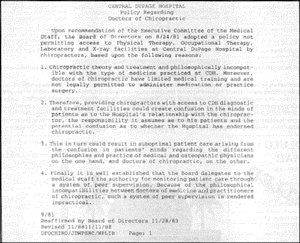Some doctors thrive in a personality-based clinic and have a loyal following no matter what services or equipment they offer, but for most chiropractic offices who are trying to grow and expand, new equipment purchases help us stay relevant and continue to service our client base in the best, most up-to-date manner possible. So, regarding equipment purchasing: should you lease, get a bank loan, or pay cash?
Illinois Chiropractor Backs Down Central DuPage Hospital

On October 13, 1989, long-time chiropractic advocate George McAndrews filed a lawsuit in the name of his client Leonard J. Chinnici, D.C., (please see "Medical Physicians' Boycott of Chiropractors Induces Racketeering Charges" in the January 3, 1990 issue and "Central DuPage Hospital Policy Regarding Doctors of Chiropractic Revealed!" in the January 17, 1990 issue). The Illinois suit was filed against the Central DuPage Hospital Association, the Mona Kea South Professional Condominium Association, the Mona Kea Owners' Association, 21 MDs and the directors of the Central DuPage Hospital.
In December, 1984, Leonard J. Chinnici, D.C., and neurosurgeon Jit Kim Lim, M.D., P.C., formed a business relationship and opened the "Neuro-Spine Center" in the Mona Kea Medical Park in a unit owned by Dr. Lim. In June of 1985, the Mona Kea Condominium Association sent the following letter:

In September, 1985, more than two-thirds of the owners of Mona Kea (almost all of them MDs) voted to amend the condominium's declaration "specifically excluding and prohibiting the occupation, ownership, or rental of a unit by chiropractors and naprapaths." Immediately after the amendment, the number of referals from members of the Central DuPage Hospital staff (many of who were also residents of the Mona Kea Medical Park) to Dr. Lim drastically decreased; likewise, the number of referrals from Dr. Lim to Dr. Chinnici decreased. This was apparently based on Central DuPage Hospital's policy on chiropractors:

For the first three months of 1986, the surgical ad hoc committee of the Central DuPage Hospital performed an extensive audit of Dr. Lim's patients. Dr. Lim was able to satisfactorily address every irregularity cited.
Under the onerous pressures of this medical "inquisition," Dr. Lim terminated his business relationship with Dr. Chinnici in January, 1986. In March, 1986, Dr. Lim was suspended from the staff of the Central DuPage Hospital.
The complaint was filed in the United States District Court for the Northern District of Illinois Eastern Division as follows:
_Complaint_"Plaintiff (Dr. Chinnici), by his attorney (George McAndrews), brings this action against the defendants for damages and injuctive relief for violations of the antitrust laws of the United States (Title 15 U.S. Code), for violations of the racketeering laws of the United States (Title 18 U.S. Code), and for tortious interference,..."
The counts of the complaint were as follows:
I. Racketeer Influenced and Corrupt Organizations Act (RICO) -- specifically, extortion
II. Conspiracy to Violate the Racketeering Influenced and Corrupt Organizations Act -- extortion
III. Intentional interference with contractual relations
IV. Intentional interference with business relations
V. Conspiracy in unreasonable restraint of trade
The two year-old lawsuit has now been settled. Dr. Chinnici has agreed to drop the case against all defendants. As a result, the Central DuPage Hospital has eliminated its policy which restricted access by chiropractors and their patients to the laboratory, x-ray, physical therapy, and occupational therapy facilities. In fact, the hospital began accepting orders from area DCs for diagnostic out-patient assistance on the day after the settlement. In addition, the Mona Kea associations have eliminated the provision in the condominium's declaration which barred the occupation, ownership, or rental of Mona Kea condominium units by doctors of chiropractic.
The fact that this incident was featured on the front page of the July 20, 1990 issue of the American Medical News ("Physicians Face Racketeering Charges in Antitrust Case"), demonstrates the importance of the lawsuit to the medical profession; they've kept a close watch on the progress of the case.
Although the case was dismissed, the positive results brought about by the suit speak for themselves.
Editor's Note: Discrimination against our profession will only continue as long as we are willing to tolerate it. Sometimes the only way to help people see the light is to turn up the heat. Hats off again to George McAndrews, Esq. for helping the chiropractic profession defend its rights and assert its value.



